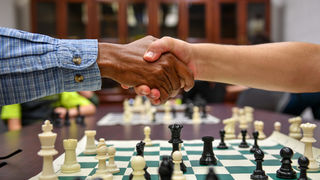Sport and Competition
Is Competition as Bad as They're Saying?
A call for balance.
Posted June 3, 2019

Today, the evils of competition get lots of ink. It’s argued that competition:
- separates people. Our stressful world is better negotiated in community.
- inhibits the cooperation that’s key to solving today’s complex problems. While earlier scientists may have made their discoveries in relative isolation—for example, Alexander Fleming's penicillin, BF Skinner's behaviorism, and Einstein’s Theory of Relativity—most of today’s problems require a team. Hence recent journal articles typically have at least a few, sometimes a dozen, coauthors.
- yields too many losers. In a common competitive situation, there are many more losers than winners. Think of all the applicants for a good job, aspiring Olympic medalists, or spelling bee contestants.
But today, we tend to pay inadequate attention to competition's benefits. In a tiny attempt to address that, consider these admittedly anecdotal examples. But I believe they reveal a larger truth:
I recall trying to get my students to memorize the multiplication table, not easy for a group not very intrinsically motivated. But when I told the class we’d divide into three groups tomorrow and each member of the winning team would get an ice cream cone, you would have thought their life depended on it. They learned so much more quickly and had a ball. Does that surprise you?
In college, I took a course in which the professor, at the first session, said, “Everyone will get an A. I want you to take risks without fear it will affect your grade.” Although I’m a pretty intrinsically motivated person and even though it was a course I was interested in (expository writing), I worked less hard than I would have. And when I asked my fellow students, they said the same. Does that surprise you?
Some friends and I got together weekly to play softball. The competition was friendly, fun, and motivating. But after a few weeks, a “progressive” and outspoken person argued for not keeping score and just enjoying the game for its intrinsic pleasures. Whatever doubts the rest of us had, we weren’t brave enough, sure enough, or cared enough to fight her. But over the ensuing weeks, fewer and fewer people showed up for the game until there were too few to comprise two teams. Interestingly, even then, no one suggested we go back to keeping score. Maybe that’s in part because in Berkeley, California, it’s not politically correct to advocate competition over collaboration. Does that experience surprise you?
As a career counselor, I’ve had a number of clients who, in the confidentiality of my office, admitted that lack of competition is demotivating. I’ve most often heard that from public school teachers, a unionized profession, in which after two or three years you have tenure for life and get paid exactly the same whether you’re a marginal or excellent teacher. I’ve also often heard that from my clients who are or wish to work for other governmental entities. They like the idea that unless they commit some egregious violation, even if they just do the minimum rather than work hard and keep learning, they’ll likely have their job forever. Does that surprise you?
The Takeaway
Personally, I dislike having to compete. I’m intrinsically motivated to work hard and don’t need the additional adrenaline that comes from having to compete. Similarly, when I participate in group recreation, I’m not very competitive. I’m mainly interested in mildly competing with myself to get better and in being a good sport, contributing to everyone having a good time.
But the pendulum seems to have swung too far—from the Oakland Raiders’ slogan, “Just win, baby,” which implies we should do whatever it takes to win, to today’s devaluing of competition in favor of the collaborative “We’re all in this together” mindset. As with most things, balance may be in order.


